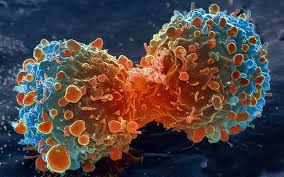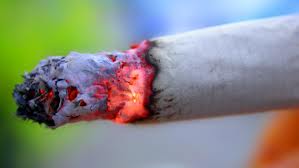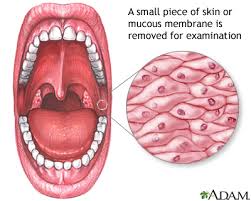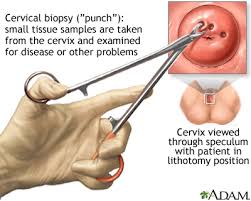Biology
 CANCER
CANCER
· Cancer is an abnormal and uncontrolled multiplication of cells resulting in the formation of tumor.
· Tumors are 2 types:
Types of cancer

Causes of cancer (Carcinogens)

§ Physical agents: E.g. Ionizing radiations like X-rays and gamma rays and non-ionizing radiations like UV.
Cancer detection and diagnosis


Treatment of cancer
 o Radiation therapy: Tumor cells are irradiated lethally, without damaging surrounding normal tissues.
o Radiation therapy: Tumor cells are irradiated lethally, without damaging surrounding normal tissues.
- Double Blasted
In this podcast, I learned about a man who survived two nuclear bombs and lived until an old age. Both accounts he was about a mile away. During a nuclear bomb, the gamma rays attack DNA and a mutation occurs. As far as the scientists know, nuclear blasts...
- Oncogene
Term: oncogene Literally meaning: ?cancer gene?Origin: Anc Greek?????/ogos(=volume) > ????? /ogoo(=raise, establish) ?????/ genea(=generation) > ?????/geno (=birth to) >Coined/HistoryIn 1969, Robert Huebner and George Todaro proposed the ?oncogene?...
- Carcinoma
Term: carcinoma Anc Greek ????????/carkinos(=crab) + ???/oma(=suffix denoting mass growth) ???????? > ???????+???? (= hard+move) Coined: by Hippocrates (ca. 460 BC ? ca. 370 BC) who noted similarity of crabs to some tumors and especially he used...
- Cancer
Term: cancer Origin: Anc Greek ????????/carkinos(=crab) ???????? > ???????+???? (= hard+move) Coined: by Hippocrates (ca. 460 BC ? ca. 370 BC) who noted similarity of crabs to some tumors and especially he used the Greek words carcinos" and "carcinoma"...
- 2/20/14
...
Biology
Cancer: Types, causes, diagnosis and Treatment
· Cancer is an abnormal and uncontrolled multiplication of cells resulting in the formation of tumor.
· Normal cells show a contact inhibition (contact with the other cells inhibits their uncontrolled growth). Cancer cells appear to have lost this property.
· Cancer cells form masses of cells called tumors.
· Tumors are 2 types:
o Benign: Confined to the place of its origin. Harmless.
o Malignant: Spread and invade nearby tissues. Harmful.
· Metastasis: The spread of cancer cells from one part of the body to another.
Types of cancer

o Carcinoma : cancer of epithelial cells
o Sarcoma : cancer of connective tissues.
o Melanomas : cancer of melanocytes
o Leukemia : blood cancer
o Lymphomas : cancer of spleen and lymph nodes.
Causes of cancer (Carcinogens)
§ Chemical agents: Tobacco smoke (major cause of lung cancer), vinyl chloride, caffeine, nicotine, mustard gas etc.
§ Biological agents: E.g. oncogenic viruses, cellular oncogenes (c-onc or proto oncogenes) etc. When C-onc (in normal cells) is activated the cells becomes oncogenic.
Cancer detection and diagnosis
o Biopsy: A thin piece of the suspected tissue is stained and examined under microscope (histopathological studies).
In case of leukemia: Biopsy & histopathological studies. Blood & bone marrow tests for increased cell counts.
o Radiography (use of X-rays), CT (Computerized tomo-graphy) scan & MRI (Magnetic Resonance Imaging).
o Use of Antibodies against cancer-specific antigens.
o Techniques of molecular biology to detect genes related to cancer. Such individuals may be advised to avoid exposure to particular carcinogens (e.g. tobacco smoke).
Treatment of cancer

o Chemotherapy: Use of chemotherapeutic drugs. Many drugs have side effects like hair loss, anaemia etc.
o Immunotherapy: The patients are given biological response modifiers (e.g. ?- interferon) which activates their immune system and helps in destroying the tumor.
o Surgery.
o Most cancers are treated by combination of surgery, radiotherapy and chemotherapy.
- Double Blasted
In this podcast, I learned about a man who survived two nuclear bombs and lived until an old age. Both accounts he was about a mile away. During a nuclear bomb, the gamma rays attack DNA and a mutation occurs. As far as the scientists know, nuclear blasts...
- Oncogene
Term: oncogene Literally meaning: ?cancer gene?Origin: Anc Greek?????/ogos(=volume) > ????? /ogoo(=raise, establish) ?????/ genea(=generation) > ?????/geno (=birth to) >Coined/HistoryIn 1969, Robert Huebner and George Todaro proposed the ?oncogene?...
- Carcinoma
Term: carcinoma Anc Greek ????????/carkinos(=crab) + ???/oma(=suffix denoting mass growth) ???????? > ???????+???? (= hard+move) Coined: by Hippocrates (ca. 460 BC ? ca. 370 BC) who noted similarity of crabs to some tumors and especially he used...
- Cancer
Term: cancer Origin: Anc Greek ????????/carkinos(=crab) ???????? > ???????+???? (= hard+move) Coined: by Hippocrates (ca. 460 BC ? ca. 370 BC) who noted similarity of crabs to some tumors and especially he used the Greek words carcinos" and "carcinoma"...
- 2/20/14
...
